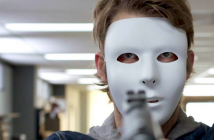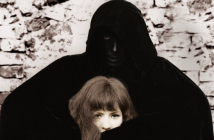
Editor’s Notes: The following review is part of our coverage for TIFF’s Dreaming in Technicolor. For more information on this TIFF film series visit http://tiff.net and follow TIFF on Twitter at @TIFF_NET.
As is Lubitsch unique form of comedy, Heaven Can Wait (1943) is frank and dryly satirical. It begins with an intertitle explaining a man’s death. There is no hidden agenda to the narrative. Convinced he does not belong ‘above’, he has arrived at some kind of checkpoint for entering hell, where he speaks with the Devil about his misdemeanors, the many women he chased. He tells about how he first learned that “if you want to win a girl, you have to have lots of beetles”. Beetles quite obviously soon becomes money, and rich as he is, Henry Van Cleve (Don Ameche), never had a shortage of beetles.
What makes Heaven Can Wait different from other films from the classical period is Lubitsch’s charming nature.
His greatest misdemeanor: stealing the fiancé of his cousin, an act which would stir trouble in both families. Martha von Strabel, played by the adorable Gene Tierney, joins him in matrimony and follows the young Casanova through a life of charm and good intentions. Never shown on screen, the plot revolves around Henry’s supposed infidelity, or at least his flirtatiousness, which is of course tantamount to his belonging in Hell.

And here follows Lubitsch’ way of winking to the audience. It is clear from the beginning that Henry does not belong in Hell, and that Lubitsch blames outdated traditions of family and marriage for Henry’s misguidedness. Like the French maid who teaches him that a kiss does not require obligation, the Devil must teach him that being passionate about the opposite sex is not a sin. His cousin may not kiss with pleasure, and his parents may not approve of eloping, but these are qualities of a former society; “this is 1887” after all, the times they are a changing!
There’s a certain kindness about the world that is captured on screen; it is all quite familiar and friendly and makes one feel good about the world.
Heaven Can Wait is quite conventional besides the fantasy scenes with the Devil. It is a story within a story, and chronicles a man’s life from childhood to death. The story is told through drama with the characters and performances leading the script. Editing and cinematography are rather perfunctory and used primarily for the purpose of telling the story and keeping characters centralized. Zooms are often utilized for closing in on characters, though at times it is used to increase empathy in the viewers. For example, when Henry sees Martha, the fiancé of his cousin, at his own birthday party, the camera zooms towards his face. An intense moment of revelation, the zoom amplifies and confirms our belief that the girl will be his love interest.
Throughout the film, there are some abrupt cuts that interrupt its rhythm. It’s difficult to tell why Lubitsch would have edited this way. The abrupt cuts show a lack of continuity and sometimes even a shift in mise-en-scene. During the handful of occasions it occurs, it is quite jarring and appears an accident more than directorial intention. Perhaps it is due to the length of film in 1943 or lost frames, in either case it makes the film momentarily seem ‘off’. It appears as if a decision to sew together two separate scenes is used as an attempt a ‘fix’ the problem, but instead it kills the film’s sense of time, it’s most inherent quality.
That said, it is a theatrical film meant to tell a story, and in spite of these few blips it continues to tell its story, and amicably so. What makes Heaven Can Wait different from other films from the classical period is Lubitsch’s charming nature. The film doesn’t necessarily seem like it’s a feel-good flick, but one can’t help but feel warm towards it. There’s a certain kindness about the world that is captured on screen; it is all quite familiar and friendly and makes one feel good about the world. Even the Devil is a kind, jovial man, and though you will find yourself in Hell if you do wrong, the Devil is only trying to be just and fair. If you make it to Heaven, well, he will applaud you himself.
Ending the story within the story is the film’s most poignant and cinematic shot. A day nurse is seen leaving Henry’s room. The camera lingers as she looks into the mirror, fixes her hair and walks away. Shortly, a young, beautiful nurse resembling Henry’s late wife appears, fixes her hair in the mirror and enters his room. The camera first lingers on the closed door before craning into the distance. When Henry is finally told that he may take the elevator up, there is one person we all know he wishes to see, and who wishes to see him. Martha, his late wife, must be up there waiting to see him. By this time, the viewer has become very fond of Martha. Relating with Henry, we can’t but feel relief and warmth at the prospect of their meeting again. A most emotive moment, it completes the abstract final shot. The nurse, like an angel appearing in Martha’s form, calls Henry to his death-where they shall be reacquainted.
Heaven Can Wait is a frank, dryly satirical, and uniquely charming film from one of the great masters of early American cinema, Ernst Lubitsch.



